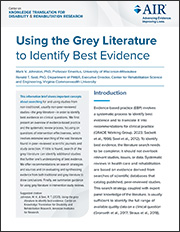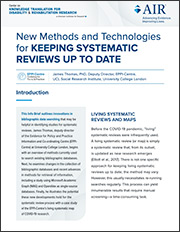Research Synthesis Info Briefs
These briefs identify and summarize emerging methods in research synthesis, such as systematic reviews, scoping and rapid evidence reviews, and evidence and gap maps.

Johnston, M. V., & Seel, R. T. (2023). Using the grey literature to identify best evidence. Center on Knowledge Translation for Disability and Rehabilitation Research, American Institutes for Research.
- Download: KTDRR-GreyLitBrief-508.pdf (Accessible, Sec. 508-compliant PDF file of the Using the Grey Literature Info Brief)
About the Using the Grey Literature brief
Using the Grey Literature to Identify Best Evidence shares important concepts about searching for and using studies from non-traditional, usually non-peer-reviewed studies—the grey literature—to identify best evidence on clinical questions. Authors Mark V. Johnston and Ronald T. Seel present an overview of evidence-based practice and the systematic review process, focusing on questions of intervention effectiveness, which involves extensive searching of the vast literature found in peer-reviewed scientific journals and study selection. Searching the grey literature can identify additional studies that further one’s understanding of best evidence. The authors offer recommendations on search strategies and sources and on evaluating and synthesizing evidence from both traditional and grey literature to draw conclusions.

Thomas, J. (2022). New methods and technologies for keeping systematic reviews up to date. Center on Knowledge Translation for Disability and Rehabilitation Research, American Institutes for Research.
- Download: KTDRR-Brief-Keeping-SR-UpToDate-508.pdf (Accessible, Sec. 508-compliant PDF file of the Keeping SR Up to Date Info Brief)
About the Keeping SR Up to Date brief
New Methods and Technologies for Keeping Systematic Reviews Up to Date outlines innovations in bibliographic data searching that may be helpful in identifying studies for systematic reviews. James Thomas, deputy director of the Evidence for Policy and Practice Information and Co-ordinating Centre (EPPI-Centre) at University College London, begins with an overview of methods currently used to search existing bibliographic databases. Next, he examines changes in the collection of bibliographic databases and recent advances in methods for retrieval of information, including a study using Microsoft Academic Graph (MAG) and OpenAlex as single-source databases. Finally, he illustrates the potential these new developments hold for the systematic review process with a case study of the EPPI-Centre’s living systematic map of COVID 19 research.
